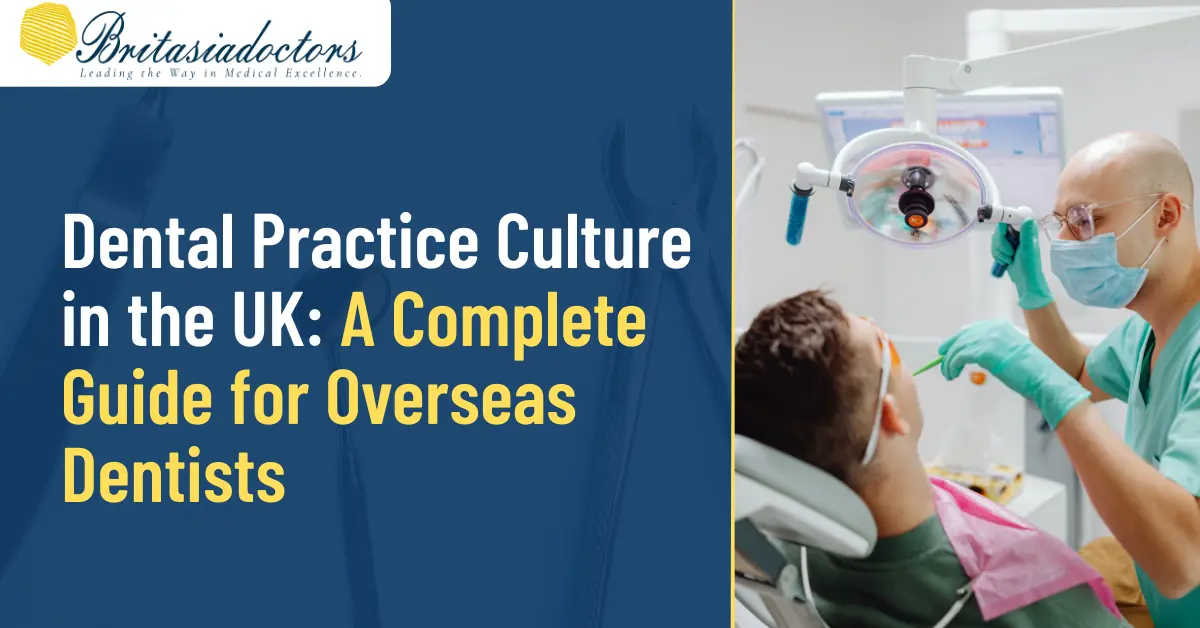
If you’re planning to start your dental career in the UK, understanding the culture, expectations, and professional values within dental practices is essential for a smooth transition.
The UK’s dental system is known for being structured, patient-focused, and ethically driven. Whether joining the NHS or a private practice, knowing how teams operate and what values guide clinical work will help you integrate with confidence and build long-term success.
This guide outlines key aspects of UK dental practice culture and offers practical insights for overseas dentists adapting to a new professional environment.
1. Patient-Centred Care: The Heart of UK Dentistry
Patient trust, comfort, and prevention-focused treatment define the UK approach to dentistry. Instead of prioritising quick fixes, UK practitioners emphasise lasting oral health and education.
As a new dentist, you’ll be expected to:
- Communicate openly, clearly, and respectfully with patients.
- Explain treatment plans and obtain informed consent.
- Show empathy and calmness, especially with anxious patients.
Building authentic relationships with patients fosters trust and strengthens your professional reputation over time.
2. Teamwork and Collaboration in Dental Practices
UK dental practices function as interconnected teams rather than hierarchies. You will work closely with dental nurses, hygienists, receptionists, and management staff to deliver comprehensive patient care.
Daily collaboration often includes:
- Team meetings to review cases and plan schedules.
- Joint decision-making for complex treatments.
- Respectful communication across all professional levels.
Being approachable, dependable, and proactive helps you fit in quickly and thrive within a supportive team environment.
3. Ethical Standards and Professional Conduct
Professionalism is a cornerstone of UK dental culture. Every practitioner must comply with strict ethical guidelines set by key regulatory bodies:
- General Dental Council (GDC): Oversees registration, competence, and conduct.
- Care Quality Commission (CQC): Monitors safety and quality of care.
Compliance with infection control, accurate record-keeping, and patient confidentiality is mandatory. Additionally, maintaining GDC registration and completing annual Continuing Professional Development (CPD) ensures you meet legal and professional standards.
4. Continuous Learning and Skill Development
The UK strongly values lifelong learning. You’ll have regular opportunities to attend CPD workshops, conferences, and skills courses to expand your professional knowledge.
Common development areas include:
- Digital dentistry and advanced technologies.
- Communication and patient interaction skills.
- Networking through organisations like the British Dental Association (BDA).
Embracing professional growth shows commitment and sharpens your competitiveness within the UK dental sector.
5. Diversity and Inclusion in Dentistry
Diversity is one of the strengths of the UK dental workforce. Many dentists come from regions such as India, the Middle East, Europe, and Africa.
Most practices promote inclusive workplaces where different cultural backgrounds and perspectives are respected. This welcoming environment helps international professionals feel supported, recognised, and part of a unified team.
6. Work-Life Balance and Wellbeing
The UK’s dental profession encourages balanced work routines, punctuality, and wellbeing. Working hours are structured, and breaks are respected to prevent burnout.
Many practices offer:
- Flexible scheduling options.
- Mental health and wellbeing programs.
- Supportive management focused on team morale.
This focus on balance ensures you can maintain quality care while safeguarding personal health and long-term job satisfaction.
7. Effective Communication and Work Etiquette
Strong communication is central to professional success in UK dental settings. You are expected to:
- Use clear, courteous, and professional language.
- Respect patients’ privacy and colleagues’ perspectives.
- Address conflicts or concerns calmly and constructively.
Simple habits like acknowledging staff, maintaining eye contact, and thanking team members contribute to a positive workplace culture.
8. What Makes UK Dental Practices Unique
What distinguishes UK dental practices from others around the world is a commitment to systems, safety, and patient-centred prevention.
Key characteristics include:
- Structured management and compliance systems.
- Widespread use of technology such as 3D scanning and digital radiography.
- CQC-regulated safety standards and regular inspections.
- Preventive education on oral hygiene and lifestyle choices.
Understanding and adapting to these unique features will help you deliver care that aligns with British healthcare standards.
Final Thoughts: Thriving in the UK Dental Workplace
Adapting to the UK dental practice culture requires more than just technical skill—it involves embracing ethical values, teamwork, empathy, and continuous learning.
By understanding what defines professionalism and patient care in the UK, overseas dentists can build meaningful careers in a globally respected healthcare system. With preparation, sensitivity, and a commitment to growth, you can thrive personally and professionally within UK dentistry.




